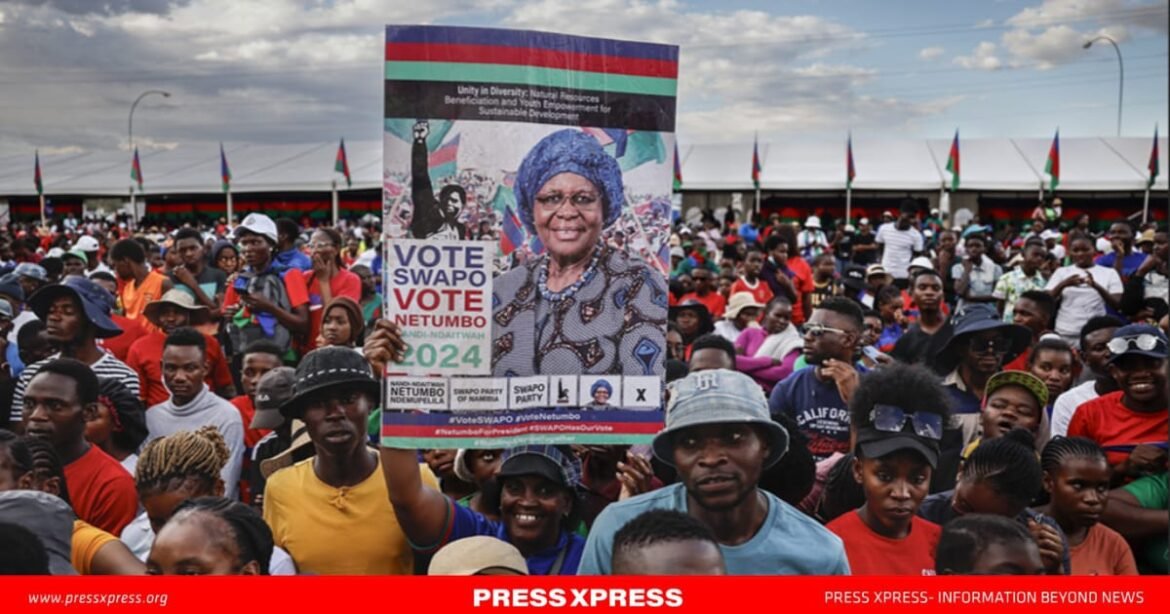Namibia heads to the polls on November 27, 2024, in a closely watched election that could see the country elect its first female president, Vice-President Netumbo Nandi-Ndaitwah
On November 27, 2024, Namibians will head to the polls in a pivotal election that could reshape the nation’s political landscape. The prospect of electing the country’s first female president, Netumbo Nandi-Ndaitwah, has drawn international attention. If victorious, the 72-year-old Vice-President would join Tanzania’s Samia Suluhu Hassan as one of Africa’s only female leaders. Yet this milestone comes amid widespread economic dissatisfaction, social inequality, and the waning dominance of Swapo, Namibia’s liberation-era ruling party.
Swapo’s Legacy and Waning Influence
Since Namibia gained independence from apartheid South Africa on March 21, 1990, Swapo has been the dominant political force, presiding over the country for more than three decades. However, the party’s influence has eroded sharply in recent years. In the 2019 elections, Swapo secured just 56% of the presidential vote—its lowest share to date—and lost its two-thirds majority in parliament. This decline reflects both domestic disillusionment and a regional trend: liberation movements across southern Africa, from South Africa’s ANC to Zimbabwe’s ZANU-PF, are increasingly viewed as out of touch with the aspirations of younger, urban populations.
Namibia’s economy compounds Swapo’s political challenges. The unemployment rate, stuck at 19% since the 1990s, disproportionately affects youth, with a staggering 50% of Namibians under 35 jobless. While the country boasts vast natural resources—including offshore gas, lithium, and rare earth metals—economic benefits remain concentrated among elites. Namibia’s Gini coefficient, which measures income inequality, ranks among the world’s highest, underscoring the country’s failure to translate resource wealth into broad-based prosperity.
The Candidates: Continuity vs. Change
The election pits two prominent figures against each other, representing divergent paths for the nation. Netumbo Nandi-Ndaitwah, Swapo’s candidate, embodies continuity. A veteran of Namibia’s liberation struggle, she joined Swapo’s youth wing at age 14 in 1966 and rose through its ranks, serving in ministerial roles for over 25 years. Her integrity and pragmatic leadership style have earned her respect. As Namibian diplomat Tuliameni Kalomoh described her, she is “incorruptible, both morally and materially.”

Netumbo Nandi-Ndaitwah has been a loyal member of the governing party since she was 14.
On the other hand, Panduleni Itula, 67, represents a fresh alternative. Once a Swapo insider, Itula was expelled in 2020 after challenging the party’s presidential candidate as an independent in the 2019 election. A trained dentist who spent much of the 1980s in exile in the UK, Itula returned to Namibia in 2013 and launched his political career. His Independent Patriots for Change (IPC) party, founded in 2020, has quickly gained traction, especially among young voters and urban professionals disenchanted with Swapo’s governance.

In Picture: Presidential Candidate Panduleni Itula
Gender Dynamics and Political Culture
A victory for Nandi-Ndaitwah would symbolize progress in a country deeply rooted in patriarchal traditions. She has championed teamwork, inclusivity, and grassroots engagement, positioning herself as a unifying figure. For many women, her candidacy represents a long-overdue challenge to Namibia’s male-dominated political establishment.
However, gender alone may not be enough to sway voters focused on economic survival. As one young voter in Windhoek observed, “Itula is like a new piece of jewelry… but maybe he blinds you with his shine,” reflecting a cautious optimism mixed with skepticism about both candidates’ ability to deliver meaningful change.
Election Stakes: A Second Round Likely?
With 15 candidates on the ballot, Namibia’s electoral system—which requires a candidate to secure more than 50% of the vote to avoid a second-round run-off—makes a decisive first-round victory unlikely. If no candidate achieves a majority, a run-off election, likely scheduled for December 2024, would be the first in Namibia’s history.
The stakes are high. A fragmented vote could further weaken Swapo, echoing recent developments in neighboring countries. In May 2024, South Africa’s ANC suffered its worst-ever electoral performance, while Botswana’s ruling party faced a historic defeat in October 2024. Swapo’s declining dominance reflects a broader regional reckoning with liberation movements failing to meet contemporary governance challenges.
Key Issues Driving Voter Decision
Several critical issues will shape voter preferences as Namibians cast their ballots:
- Youth Unemployment: With half the electorate under 35, job creation remains a top priority. Itula’s outsider appeal and economic reform agenda have resonated with this demographic, but Nandi-Ndaitwah’s experience in governance may attract voters seeking stability.
- Corruption and Governance: Allegations of graft, particularly the “Fishrot” scandal that surfaced in 2019, have tarnished Swapo’s reputation. While Nandi-Ndaitwah’s personal integrity is a strength, it may not be sufficient to overcome public distrust of the party.
- Resource Management: Namibia’s vast untapped resources, including lithium and offshore gas, offer significant economic potential. However, voters are wary of foreign exploitation and demand policies that ensure local benefit.
- Public Services: The COVID-19 pandemic exposed weaknesses in Namibia’s healthcare and education systems. Both candidates face pressure to articulate clear, actionable plans to improve these critical sectors.

Namibians wait to vote at a polling station during Namibian presidential and parliamentary elections on November 27, 2019, in Windhoek. (Credit: AFP)
The Challenge of Delivering Change
Whoever emerges victorious on November 27 will inherit a nation at a crossroads. Economic recovery, especially for Namibia’s marginalized youth, will require bold reforms, strategic resource management, and the restoration of public trust in government institutions.
If Nandi-Ndaitwah wins, she will face the dual challenge of modernizing Swapo and addressing growing public discontent. Conversely, an Itula presidency would mark a dramatic political shift, raising expectations for swift, visible change. Either outcome will test Namibia’s resilience and capacity for reform.
Beyond its borders, Namibia’s election will be closely watched as a barometer for southern Africa’s evolving political dynamics. The outcome will not only determine the country’s leadership but also reflect broader trends in the region’s struggle to balance liberation-era legacies with modern governance demands. For Namibia, this election is not just about breaking gender barriers—it is a referendum on the country’s past, present, and future.


